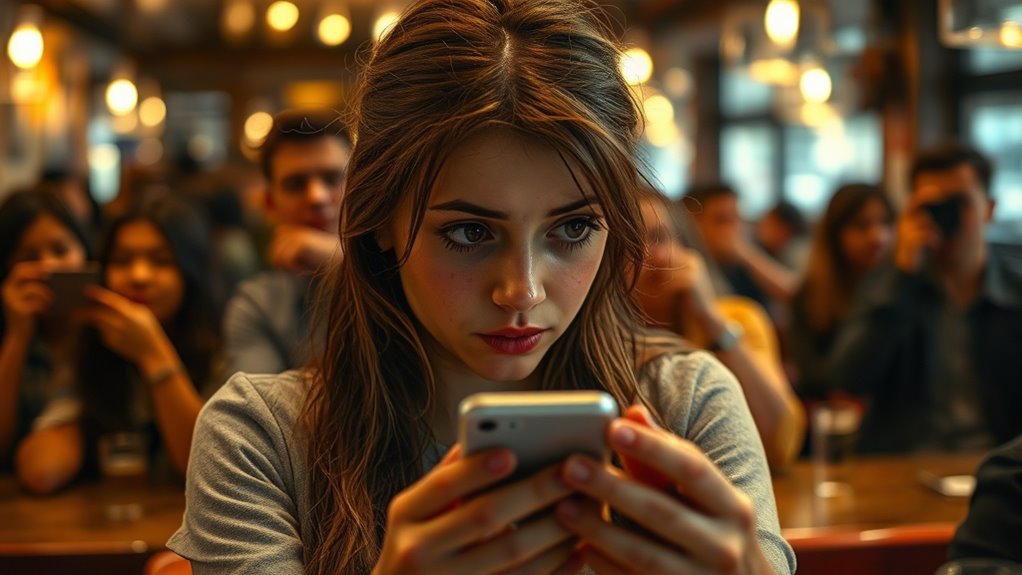When cheating drama goes viral on social media, you see how quickly private moments become public, often within minutes. A single post or screenshot can spread widely, leading to intense public scrutiny and emotional reactions from strangers. You might notice reputations damaged and lasting digital footprints that are almost impossible to erase. Social media amplifies both exposure and judgment, highlighting the blurred lines between privacy and accountability. Stay with us to uncover how these scandals unfold and their deeper impacts.
Key Takeaways
- Social media rapidly spreads cheating scandals, turning private issues into viral stories within minutes.
- Public reactions range from judgment to defense, often fueled by heightened emotions and anonymity online.
- The accused face intense scrutiny, reputation damage, and long-lasting digital footprints from viral exposure.
- Sharing personal details without consent raises ethical concerns and can cause irreversible emotional harm.
- Viral scandals reflect societal shifts in privacy, accountability, and the power of social media to influence public opinion.

When a cheating scandal erupted on social media, it quickly captured everyone’s attention and sparked widespread debate. Suddenly, what might have been a private matter became a public spectacle, with thousands of people weighing in on who was right or wrong. You might feel surprised at how fast the story spread, catching the attention of friends, followers, and even strangers. The power of social media means that a single post or screenshot can turn a personal issue into viral content in minutes. You realize that in today’s digital age, privacy is fragile, and secrets are hard to keep once shared online.
Social media turns private scandals into viral stories in minutes.
As the story circulates, you notice how different people respond. Some rush to judgment, calling out the accused without knowing all the facts. Others defend them, arguing that everyone makes mistakes or that there’s more to the story than what’s visible. You might even see heated arguments unfold in the comments, with strangers exchanging harsh words. It becomes clear that social media doesn’t just spread information; it amplifies emotions. The anonymity and distance give people a sense of power they might not have in face-to-face interactions, leading to more aggressive or sensational reactions.
You also see how the scandal impacts the individuals involved. The person caught cheating may face intense scrutiny, with their reputation damaged overnight. Their friends and family might feel embarrassed or betrayed, and the public shaming can be relentless. It’s a stark reminder that once something is online, it’s nearly impossible to erase entirely. Even if the person tries to move on, the digital footprint remains, haunting them long after the story fades from the headlines. You might reflect on how social media has transformed accountability — now, everyone can witness a misstep instantly, and public opinion can be swift and unforgiving.
Furthermore, the viral spread of such drama prompts questions about privacy and ethics. You understand that some stories are shared without consent or context, which can lead to unfair judgment and emotional harm. While the desire to expose wrongdoing can seem justified, it also raises concerns about voyeurism and the ethics of sharing personal details online. As you watch the story unfold, you’re reminded that social media acts as both a platform for justice and a space for sensationalism. It’s a double-edged sword that can bring issues to light but also cause irreversible damage. Ultimately, you see that when cheating drama goes viral, it’s not just about the scandal itself — it’s about how society processes, reacts to, and sometimes sensationalizes the secrets that once stayed hidden behind closed doors.
Frequently Asked Questions
How Do Social Media Algorithms Influence Cheating Drama Visibility?
Social media algorithms play a big role in how cheating drama becomes visible. They prioritize content that gets lots of engagement, like likes, comments, and shares. If your post about cheating drama sparks strong reactions, the algorithm pushes it to more users’ feeds. So, you often see drama going viral because the platform amplifies emotionally charged stories, making them more visible to a wider audience quickly.
What Privacy Rights Do Individuals Have in Viral Cheating Scandals?
Imagine your private moments suddenly splashed across a digital billboard, eyes everywhere. In viral cheating scandals, you have rights to privacy, but social media’s open nature can complicate that. You can request content removal, challenge defamation, or seek legal action. Though the internet’s vast, your rights still protect you from unwarranted exposure. Remember, knowing your privacy options empowers you to control your story amidst the chaos.
How Can Victims Protect Their Reputation After Exposure?
You can protect your reputation by acting quickly and calmly. Start by issuing a clear, honest statement to address the situation, and consider reaching out to trusted friends or professionals for support. Avoid engaging in online arguments or sharing more details. Focus on demonstrating accountability and maintaining your integrity. Over time, consistent positive actions can help rebuild your image and restore trust among those affected.
Are There Legal Consequences for Sharing Cheating Allegations Online?
When you share cheating allegations online, you could face legal consequences like defamation or invasion of privacy lawsuits. Even if your intentions are good, spreading false or unverified information can damage someone’s reputation and lead to legal trouble. Always consider the potential repercussions before posting sensitive accusations. It’s best to seek legal advice or handle such matters privately to avoid risking lawsuits or other legal actions.
How Does Viral Cheating Drama Impact Mental Health of Those Involved?
You might feel overwhelmed or anxious when facing viral cheating drama. The intense public scrutiny can lead to stress, embarrassment, and even depression. You may struggle with trust issues or fear of judgment from others. The constant attention amplifies emotional distress, making it harder to cope. It’s essential to seek support from friends, family, or mental health professionals to protect your well-being during such challenging times.
Conclusion
You might think sharing these scandals helps hold people accountable, but it often fuels unnecessary drama and invasion of privacy. Instead of becoming part of the viral chaos, remember that real relationships deserve respect and discretion. By choosing to stay out of the gossip, you protect your own integrity and encourage healthier, more thoughtful conversations online. Don’t let the allure of viral fame overshadow the importance of kindness and privacy in today’s digital world.









